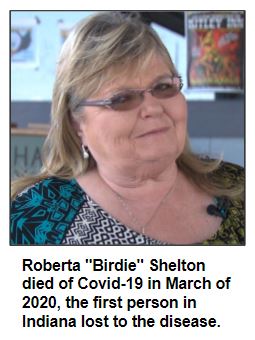Apr 30, 2021
The Covid-19 pandemic obviously will be the focus of work by future historians. But enough history has unfolded already for Hoosier History Live to explore the beginnings of the health crisis in Indiana, including the first diagnosed case and the first death in the state.
During this show, we also will compare the spread in urban and rural areas, describe early challenges in contact tracing and explore other aspects of the emerging epidemic. Nelson will be joined by a journalist who has covered the impact of Covid-19 in Indiana since it entered public awareness.
Shari Rudavsky, the health and medical reporter for the Indianapolis Star, wrote a front-page story last month that described the earliest Hoosier cases of Covid-19 that "provided a harbinger of dark days." Shari, who has a PhD in the history and sociology of science, wrote about the state's first case, which was diagnosed in early March 2020. A patient at Community Hospital North in Indianapolis, the man (whose name has never been released) "was well enough to ride out his illness in a hotel quarantined from his family," Shari reported.

Also in March 2020, Shari wrote about the challenges that suddenly were confronting hospitals in rural areas and small cities, including Good Samaritan Hospital in Vincennes.
During our show, Shari and Nelson also will discuss an early outbreak in Logansport at a Tyson Foods meat-packing plant, the largest employer in Cass County.
Shari also will share insights about, as she puts it, "the challenges of explaining new terminology and new science - such as coronavirus, spike protein [and] other terms - that previously were unknown to most readers, including myself."
Last April, the state of Indiana signed a $43 million contract with Maximus, a health and human services provider, to assist state and local health departments in contact tracing. Analyzing the efforts several months later in an Indianapoli Star article, Shari wrote: "What effective contract tracing most requires is sufficient staff to reach out and conduct in-depth interviews with all touched by a virus. Until recently Indiana, like the rest of the nation, was woefully short-staffed."
Shari also reported on why simple preventative measures to stop the spread took a long time to get through to much of the public. Drawing a comparison with the push years ago regarding seat belts in cars, analysts noted to her that many people "fought back when public health officials first started recommending everyone buckle up."
Some Covid in Indiana history facts:
- The Hoosier diagnosed with the first case in the state "already suspected he had the virus" before he was tested at Community North, Shari reported. That meant the hospital staff could take proper precautions when he arrived.
- The extensive volunteer activities of Roberta "Birdie" Shelton, the first Hoosier to die from the coronavirus, included helping organize fund-raisers to assist the families of two girls from Delphi, Ind., who were murdered in 2017. The case, which continues to draw national publicity, remains unsolved.
- More than 12,840 people in Indiana have died of Covid-19. Since March 2020, more than 710,600 Hoosiers have tested positive for the coronavirus.